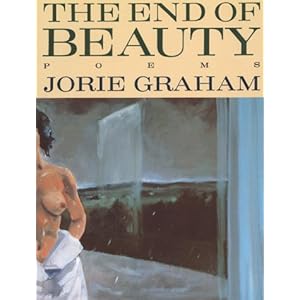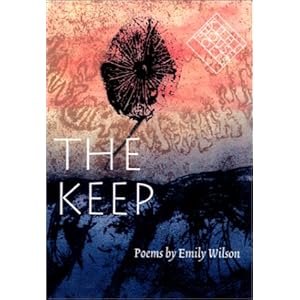Titles that successfully descry the mysteries of their books with "The ______" are rare gems in this world. Let's play around with those successful poets who in kind have successful titles that earn this construction.

THE END OF BEAUTY by Jorie Graham
Possibly the best book of poems to come out in the last twenty years (okay, 1987 was more than twenty years ago but since I can't adequately wrap my mind around the year 2010, we're going to be a little liberal with our estimates). This title has everything. A position on poetry, on self, on myth. Imagine how diffused and flat this title would have been were it borne without the The. The realm of possibility, with a title like this, is endless, but Jorie is able to contain it with a winged rhetoric and clearly-drawn center.

THE US by Joan Houlihan
I'm skipping around here, but this baby just came out. This title resonates with the dimensions of folklore and subsequently, identity. Using our everyday pronouns as tribal appellations, her syntax is jarring and the meaning threshed clean only when we detach ourselves from the usual associations that come with grammar. Lines like "She were the watcher and tender of pyres" and "Ay lived and spoke to what ay was" only dredges the mythos of the title deeper.

THE MASTER LETTERS by Lucie Brock-Broido
So, while Jorie's THE END OF BEAUTY is, to my mind, the best collection to come out in twenty years, this is my favorite collection to come out in the last twenty years. Obviously (or not so obviously), this is riffing off of Emily Dickinson's torqued letters to a "master." But this collection is as much about the master thou (who need we even say is male) as it is about the irony of "the master," who in this book stays the silent figure, or in another word the object, while the subject wildly dances the dance of purposefully over-the-top and vaulting diction. They are not letters to a stranger (Thomas James' collection which Lucie belovedly resurrected from obscurity) but rather, letters to a monument, though even this designation is overwrought. The Master Letters. It can be nothing other.

THE KEEP by Emily Wilson
A little over a year ago, a friend mentioned this book to me. I took one look at the first poem "Nonesuch" and within a week, THE KEEP was mine. The love I felt for this book was borderline unhealthy. Maybe because it was so outside of my style, and yet so within the realm of ideas I had and still have about poetry. So many of the poems are slight, negating scenes of nature through negotiations with the thou figure. When they aren't slight, they are long and sectioned poems, part field guide part aubade. What makes THE KEEP such a great title is its simplicity, its improbable noun-ness, the lovely gesture that a collection IS the keep to the poet's psyche. Fab.
So those are spotlights, but there are others, so many others. THE BEAUTY OF THE HUSBAND by Anne Carson comes to mind. But this is all to say, there is a certain power to titles like these, titles which signify not just an overarching theme for the collection, but are themselves the signifier or the portal into, as Vincent Hugo would call it, "un monde enfermé dans un homme," or a world kept inside a man.
Well. That does have some luster to it when put that way, especially for my collection. But then what about the one-word titles? Consider the spell of some of these words alone: RAPTUS, DEBT, SPELL, DEPOSITION, NEVER, TREMBLE. I think of one-word collections and I immediately think of ARIEL, a collection rising from the runes of a single word. What ultimately makes the delivery of this title type different from that of "The_____" titles are the claims. To name Mark Levine's debut collection THE DEBT, that would imbue a strategy over the whole collection, towards resolution (perhaps asymptotically). As it stands without article, however, its function is geared more toward artifice as a means, perhaps, to solution. Just as THE END OF BEAUTY would be radically removed of urgency and project were it called AN END TO BEAUTY or AN END OF BEAUTY. Gag me with a spoon; I'm so glad Jorie's a brilliant technician. The remarkable one-word title seems gifted to only the most pure of hearts. And since the very idea of a one word designation brings me closer to ulcers, I'm going to confess a heart of filthy cowardice on that one.
There are of course other options. The sentence title. The sentence can function as a fluting title over the whole collection. Here is one of the first pictures that show up when I type "fluting collection" into Google Images:

Zomg, a fluted bezel!
But no, I rather like this fancy watch as a metaphor, if for no other reason than it stands as a fully functioning accessory. Classy, perhaps at times gaudy and showy, but one can navigate the space time continuum pretty well with one of these gadgets. I unleashed pretty hard with my "The _________" titles because this construction seemed so alluring to me, me who thinks there are aligning powers at work in my measly collection. But I'm thinking now this choice for a title will ultimately triumph, as this provides an accessible route into the poet's imagination, and sounds downright beautiful if done right. Here are some examples of doin it and doin it and doin it well:

IF BIRDS GATHER YOUR HAIR FOR NESTING by Anna Journey
This book is fierce. Fierce. FIERCE. It's like I'm being beaten senseless while simultaneously falling in love with a sassy red-headed lady. Which is fine by me. The title cues us in on the power of the voice, which leans on point A of a logic equation, the poems themselves point B. One begins the collection in terror of what it means for birds to gather their hair for nesting--does it mean death becomes them, or simply that birds have found stray pieces carried off by the wind (almost romantic against the posthumous option)--and we leave with the chill of such lines like "Look, when that girl stared Zeus down/in all his glory, her hair was all flame for a moment.//And it was worth it." Hair today, gone never.

WHEN ALL OUR DAYS ARE NUMBERED MARCHING BANDS WILL FILL THE STREETS & WE WILL NOT HEAR THEM BECAUSE WE WILL BE UPSTAIRS IN THE CLOUDS by Sasha Fletcher.
Holy Moly, I forgot just how long that title was until just this moment. But so much of the language in this book reflects the preemptively lavish language applied to the title. It's a book that relies on everything you get from the title: an outside and an inside (which occur paradoxically at once), an overdeveloped imagination, apocalyptic ceremony. This shit is tumescent.
So many others. I HAVE TO GO BACK TO 1994 AND KILL A GIRL by Kathryn McGlynn is a book I've been meaning to read because of its amazing title. What strikes me about these titles is, again, the accessibility mixed with a certain sangfroid, an audacity which always makes for higher stakes.
This was rather long-winded, but this is all to suggest that book titles carry the whole ecosystem of a collection with them, and that there is an entirely different art attached to the naming of a body of work. It's using that same word-maestro area of the brain, but with more gusto so as to avoid sinking to a level of preciousness that will, at best, blend in with the rest of the slush. At worst, it'll lead to a whole blog entry on gorgeous titles where one tries to avoid saying I'M REALLY FUCKING JEALOUS after every other sentence—you know, were one to do such a heinous thing.
Natalie--I enjoy your writing beyond belief. Ugh. Really. Glad you are blogging...
ReplyDeleteTitles. Are. The. Worst.